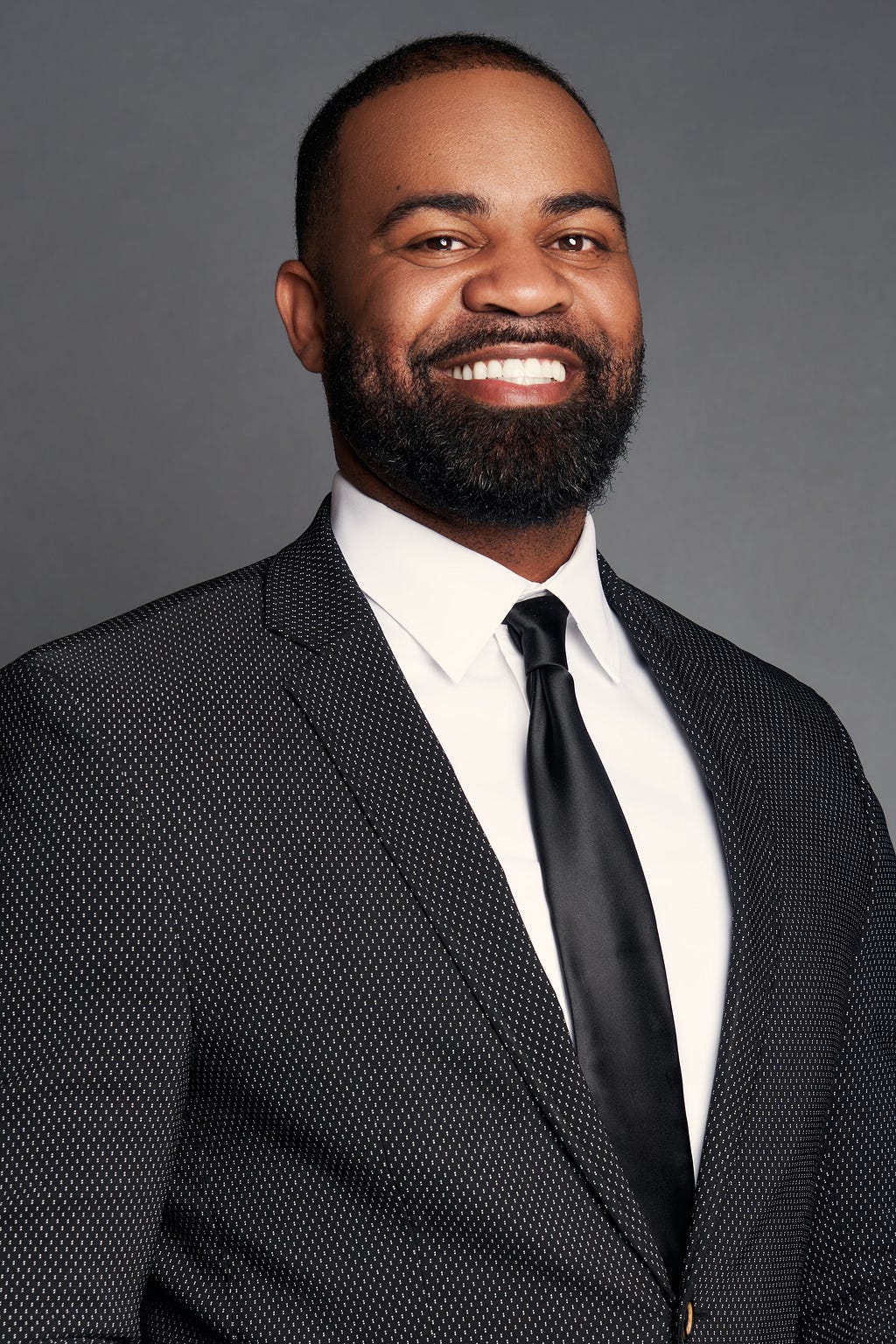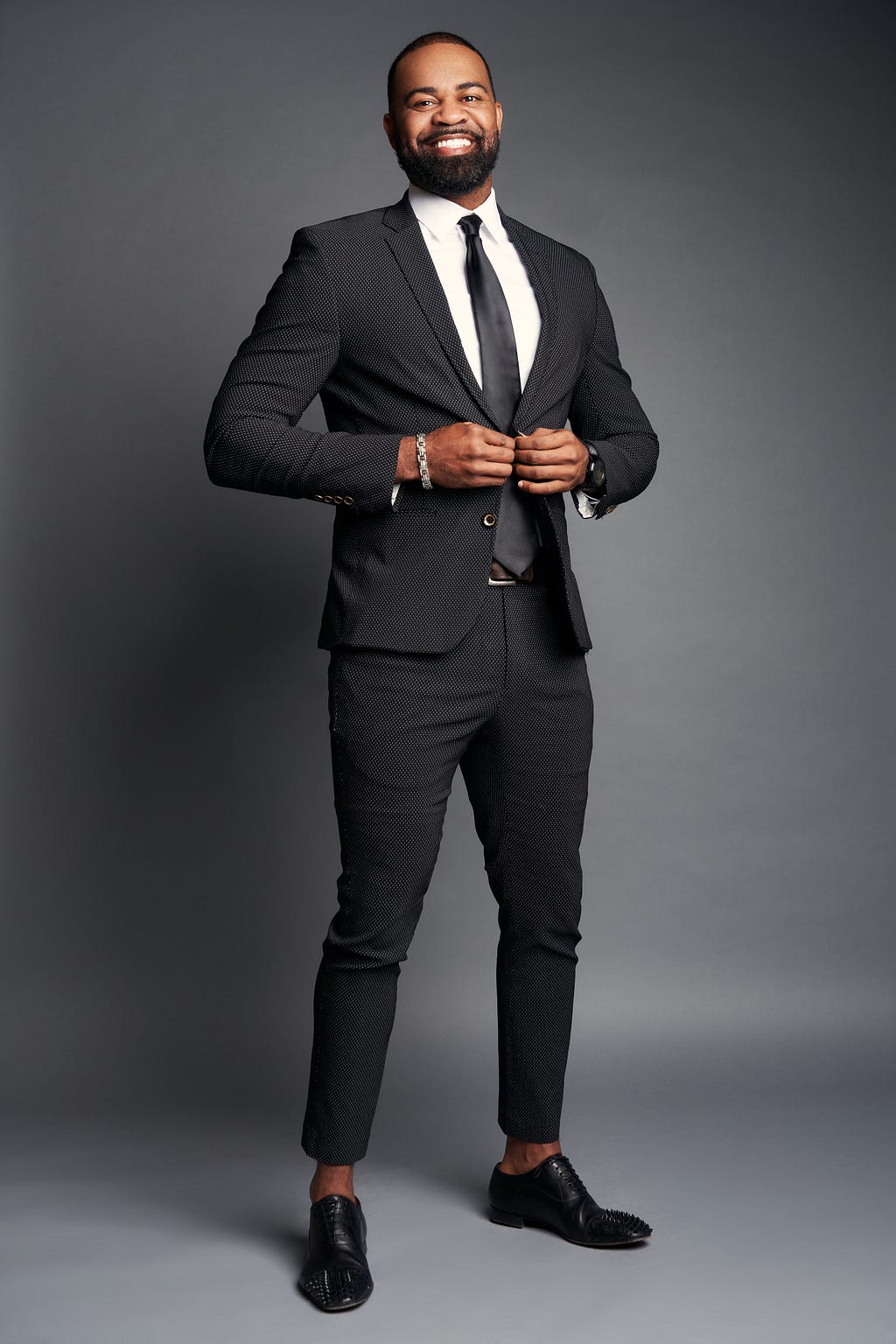Michael Fountain of BAM: 5 Steps We Must Take To Truly Create An Inclusive, Representative, and Equitable Society

My five steps to truly create an inclusive, representative, and equitable society are based upon the realization that it is naïve to think that we can go through diversity and inclusion training and that miraculously widespread change will happen. Therefore, my first step is Self-Realization. One must initially come to terms with the notion that a lifetime of learned behavior will not change overnight despite how ambitious our desires and efforts are.
As part of our series about ‘5 Steps We Must Take To Truly Create An Inclusive, Representative, and Equitable Society’ I had the pleasure to interview Michael Fountain.
Michael Fountain is BAM’s Associate Vice President of Operations. Michael is responsible for all generated revenue within BAM including performance, strategy, operation alignment, growth, marketing, and profit. Michael holds a master’s degree from Southern Methodist University specializing in Information Engineering and Management, a Bachelor of Science degree from Jackson State University, and currently pursuing a Ph.D. in Global Leadership and Change from Pepperdine University.
Thank you so much for doing this with us! Before we dig in, our readers would like to ‘get to know you’. Can you tell us a bit about how you grew up?
I grew up in a small town named Woodville, MS, a community of about three to four thousand people. Although the town is tiny, it has an abundance of fantastic food, no traffic lights, and everyone knows everyone. Though this depiction of small-town living may sound tranquil and ideal, it is a very segregated city. The town has two separate school systems: public and private. Everyone in the surrounding areas knows this construct to be the public school system for black children and the private school system for white children. Despite the town’s designation as a low-income area, white citizens find some way to continuously pay the school’s tuition resulting in an ostracized community for the black citizens with little to no chance of living in a diversity-rich community. Nonetheless, I am thankful for my parents, who taught me to love everyone and not be judgmental regardless of who people are. Watching the segregation of my hometown and learnings from my family helped mold my thinking today.
Is there a particular book that made a significant impact on you? Can you share a story or explain why it resonated with you so much?
A book that had a significant impact on my life was Alice Walker’s The Color Purple. This selection was compelling because it reminded me of the varying women that collectively shaped me into the man I am today. As a male feminist, I was moved by the different degrees of self-realization that several characters had to cope with in the face of toxic masculinity, stereotypical gender roles, and the suppression of one’s voice. Despite being a male, I resonated with the Celie character because I saw parallels between her plight and mine. Like Celie, I broke the chains of subjugation as I learned to live my truth.
Do you have a favorite “Life Lesson Quote”? Do you have a story about how that was relevant in your life or your work?
Amongst my friends, I like to say, “God does not like ugliness, and He isn’t too fond of pretty either.” I say this as a constant reminder because it does not matter what walk of life one comes from, your financial status, or your physical appearance in this world; however, we are all the same in God’s eyes and must continue to love and respect all regardless of one’s social position, outside appearance, and finances.
How do you define “Leadership”? Can you explain what you mean or give an example?
Leadership is when a person accepts a role of power when one is self-aware, open to constructive criticism, and not afraid to take risks when tough decisions must be made. Leading in this capacity will allow for the nurturing of diverse concepts while motivating others to reach their full potential while satisfying the organization’s ultimate goals.
Ok, thank you for all that. Now let’s move to the main focus of our interview. In the summer of 2020, the United States faced a very important self-reckoning about race, diversity, equality and inclusion. This is of course a huge topic. But briefly, can you share your view on what made the events of 2020 different from racial reckonings in the past?
I do not think the events of 2020 were different from the racial reckonings of the past. I feel like America has been filling its melting pot of diversity with an overwhelming amount of intolerance that has caused things to boil over. The outpour of hate spewed in the media, especially under America’s past administration, caused many Americans to be fed up with the unfair means of discourse that caused social unrest.
Can you tell our readers a bit about your experience working with initiatives to promote Diversity and Inclusion? Can you share a story with us?
I have been actively speaking with organizations on how their diversity climate is going and furthering those development stories. During the wake of George Floyd’s death, many organizations made pledge campaigns, whether financial or organizational, and worked to ensure these organizations were still walking the walk.
This may be obvious to you, but it will be helpful to spell this out. Can you articulate to our readers a few reasons why it is so important for a business or organization to have a diverse executive team?
It is essential for a business or organization to have a diverse executive team to set the tone for a diverse workforce. Everyone within an organization should feel as though their voices matter. Suppose everyone on the executive board looked the same. In that case, it could cause resentment and dissension when an organization’s melting pot of employees feels like their race keeps them from ascending to new heights. Seeing a diverse executive team provides a sense of self-assurance that all ideas, cultures, and identities will be nurtured and respected.

Ok. Here is the main question of our discussion. You are an influential business leader. Can you please share your “5 Steps We Must Take To Truly Create An Inclusive, Representative, and Equitable Society”? Kindly share a story or example for each.
My five steps to truly create an inclusive, representative, and equitable society are based upon the realization that it is naïve to think that we can go through diversity and inclusion training and that miraculously widespread change will happen. Therefore, my first step is Self-Realization. One must initially come to terms with the notion that a lifetime of learned behavior will not change overnight despite how ambitious our desires and efforts are.
Once we have come to terms with the fact that many years of learned behavior will not change instantaneously, we must develop a meaningful Approach to address diversity and conclusion amongst those who understand the importance alongside others who do not find significance in this social construct. Approaching diversity and inclusion as a problem that must be fixed can force some people to be defensive and nonreceptive to the opportunity of working together to see the benefits of being inclusive.
Furthermore, suppose diversity and inclusion are tailored as a problem. In that case, all efforts will likely be generalized as a reaction to discrimination issues which can be counterproductive as the goal is for everyone to approach inclusion, representation, and equity as a strategy to bolster camaraderie. Illumination is the next step as we assess the methods, training, and results used in the past to form first-hand practices that are conducive to what we are trying to achieve as an organization and as a society.
We should move away from the one size fits all approach that diversity training is the only means of creating a knowledgeable populace who appreciates the benefits of an inclusive, representative, and equitable society. Therefore, we must Establish Goals that institute a sense of direction. Everyone joining our organization is aware of the desired results of our diversity and equity strategies.
Leadership Training and Implementation: Suppose the executive board establishes, defines, and implements goals. In that case, there is an excellent chance that everyone within the organization can collaboratively plan and commit to achieving the desired result. Seeing colleagues in leadership positions working to achieve the same goals expected as everyone else provides a sense of teamwork that everyone can invest in while alleviating the concern that leadership is beyond working to create a haven for diversity. We must all work together for the greater good!
We are going through a rough period now. What makes you optimistic about the future of the US? Can you please explain?
Despite America’s underlying tones of racism, ultimately, America is still the land of opportunity. Possessing a leadership role as a black man in California while hailing from the small town of Woodville, MS gives me a sense of pride that cannot be erased when tough times are ahead of us. As Booker T. Washington once said, “Cast Down Your Bucket” at the Atlanta Compromise Convention to emphasize the belief that people should make the most of any situation they find themselves in. The history of my people alone forces me to always look to better days so those behind me can step on my shoulders to reach newer heights; therefore, I must remain optimistic.
Is there a person in the world, or in the US, with whom you would like to have a private breakfast or lunch, and why? He or she might just see this, especially if we tag them.
I would like a private breakfast with Onika Miraj, the global superstar better known as Nicki Minaj. I would like to have a private breakfast with her because she persevered amid obstacles aimed at destroying her character and ruining her reputation. She rose this year like a phoenix from the ashes by dominating the rap genre well over a decade into her career. It takes great strength to persevere when the odds are not in your favor. Therefore, I would like to ask her how she remained calm through so much adversity while remaining motivated to excel and reach new heights in her career when she could have rested on her laurels.
How can our readers follow you online?
You can find me on LinkedIn here: https://www.linkedin.com/in/michael-fountain-11a4b899/
This was very meaningful, thank you so much. We wish you only continued success on your great work!
Michael Fountain of BAM: 5 Steps We Must Take To Truly Create An Inclusive, Representative, and… was originally published in Authority Magazine on Medium, where people are continuing the conversation by highlighting and responding to this story.
